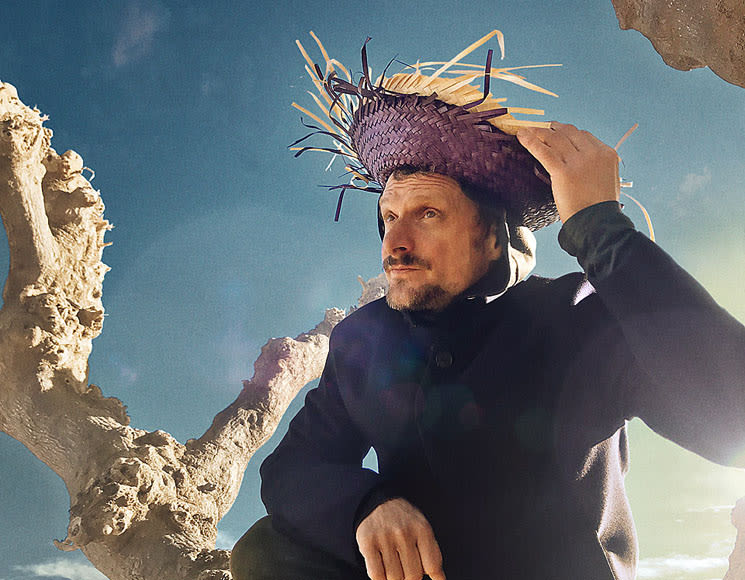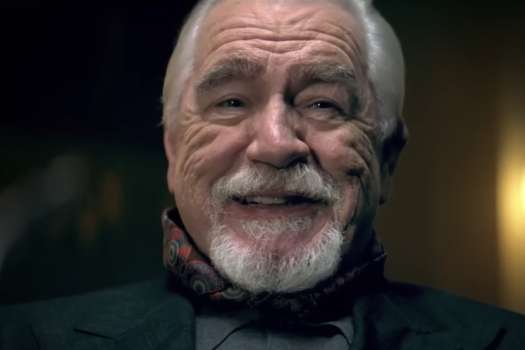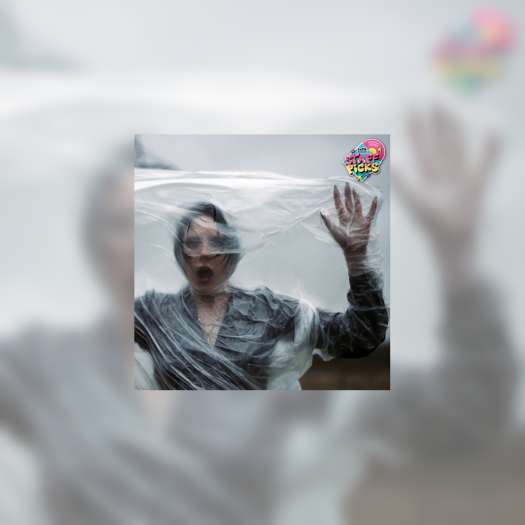DJ Koze has some retirement plans if music doesn't work out. A little pre-interview chat about cooking leads the German DJ, turntablist and producer to muse about one day opening a sandwich shop. "Music-making is the same," he tells Exclaim! "You're choosing ingredients, there's balance and counter-balance…"
He's not quite ready to give up the DJ life yet — he's dropping Knock Knock this week, his first artist album since 2013's Amygdala, and it's not like he's been slacking in between. He heads up the respected Pampa Records label, alongside friend Marcus Fink, and he contributed to !K7's respected DJ-Kicks series in 2015.
But it's not the music-making that Koze would like to get away from eventually — it's the travel. "I'm really the DJ, amongst my colleagues, who is the most lazy," he claims. "They are playing, like hundreds of times a year, and I play maybe 30 or 40 times."
One destination Kozalla has no qualms about traveling to however, is his village retreat in Catalonia, in north-eastern Spain, where he's been spending half the year lately. It's also where Knock Knock's surreal cover photo was taken — the artist perched nimbly on a gnarly and otherworldly tree.
"It's a tree," he explains, "but it's also more like a vegetable. You can cut it in slices and sauté it — a strange Mediterranean plant, like a thick ginger." It's exact name proved indecipherable over the phone so it remains a mystery — perhaps appearing as a secret ingredient at the Koze sandwich bar. But the mental image of tree-climbing Kozalla, making sandwiches in the picturesque Spanish countryside, away from the hubbub of international touring, is kinda delightful.
Having come up in the '90s with Hamburg-based hip-hop group Fischmob, Kozalla admits to being bemused, but ultimately accepting of the way his beloved genre has changed over the years. While cognizant of trying not to sound like "an old grandpa," he admits: "I really don't get this [modern trap] sometimes, with it's fantasy lyrics, and its Auto-Tune, and these lost souls I see in the videos — codeine and everything. I really don't get it, because it sounds a bit plastic and simple. But at the same time, it's the privilege of young people to have music that their elders don't understand, and I was the same, with, say, Public Enemy. I couldn't talk with my father about this! And now, maybe it's the same with trap. I think I can judge it, but maybe I can't."
Koze admits to a fondness for his earlier era, to be sure. "It was so colourful, hip-hop, with Public Enemy, with NWA, every type of hip-hop was there — everything was super-colourful, and soulful, and every crew from every city had a different approach and a different idea. Now everything sounds more or less similar. Where normally there's a kind of evolution everywhere, like in science, in music there's the possibility of regression…"
One could wile away many a sunny Spanish afternoon contemplating the progress of music-making against the arc of human evolution, but instead, we discuss the concomitant shift in DJ technology: from turntables to digital for most working DJs today.
"Something deep inside of me [is] happy that I could witness and learn all the old-school techniques that I learned for years to make music fit together — it's difficult with vinyl. And from there, it got easier and easier for me. Again, I don't want to sound like an old grandpa with his wisdom; I think everything is supposed to be as it is. This younger generation has to deal with other difficult topics, so maybe it's good that they can relax while mixing."
Those "other difficult topics" might amount to an existential burden for today's youth. "Their brains are, from morning until evening, under fire — they wake up with Instagram, and Facebook, and timelines. They get their smartphone, and from this point on it's like information, information, information!"
Kozalla lightheartedly offers a fantasy scenario that may or may not reflect his predilection against excess traveling: "The club in 30 years will be a silent place where everybody just hears the music through channels inside their brain, and the DJs are just sending their signals from home."
We'll all be grandparents by then, but hopefully with Kozalla still filling our heads (literally perhaps) with his distinct blend of vintage samples and modern flourish.
Knock Knock drops on May 4 on Pampa Records.
He's not quite ready to give up the DJ life yet — he's dropping Knock Knock this week, his first artist album since 2013's Amygdala, and it's not like he's been slacking in between. He heads up the respected Pampa Records label, alongside friend Marcus Fink, and he contributed to !K7's respected DJ-Kicks series in 2015.
But it's not the music-making that Koze would like to get away from eventually — it's the travel. "I'm really the DJ, amongst my colleagues, who is the most lazy," he claims. "They are playing, like hundreds of times a year, and I play maybe 30 or 40 times."
One destination Kozalla has no qualms about traveling to however, is his village retreat in Catalonia, in north-eastern Spain, where he's been spending half the year lately. It's also where Knock Knock's surreal cover photo was taken — the artist perched nimbly on a gnarly and otherworldly tree.
"It's a tree," he explains, "but it's also more like a vegetable. You can cut it in slices and sauté it — a strange Mediterranean plant, like a thick ginger." It's exact name proved indecipherable over the phone so it remains a mystery — perhaps appearing as a secret ingredient at the Koze sandwich bar. But the mental image of tree-climbing Kozalla, making sandwiches in the picturesque Spanish countryside, away from the hubbub of international touring, is kinda delightful.
Having come up in the '90s with Hamburg-based hip-hop group Fischmob, Kozalla admits to being bemused, but ultimately accepting of the way his beloved genre has changed over the years. While cognizant of trying not to sound like "an old grandpa," he admits: "I really don't get this [modern trap] sometimes, with it's fantasy lyrics, and its Auto-Tune, and these lost souls I see in the videos — codeine and everything. I really don't get it, because it sounds a bit plastic and simple. But at the same time, it's the privilege of young people to have music that their elders don't understand, and I was the same, with, say, Public Enemy. I couldn't talk with my father about this! And now, maybe it's the same with trap. I think I can judge it, but maybe I can't."
Koze admits to a fondness for his earlier era, to be sure. "It was so colourful, hip-hop, with Public Enemy, with NWA, every type of hip-hop was there — everything was super-colourful, and soulful, and every crew from every city had a different approach and a different idea. Now everything sounds more or less similar. Where normally there's a kind of evolution everywhere, like in science, in music there's the possibility of regression…"
One could wile away many a sunny Spanish afternoon contemplating the progress of music-making against the arc of human evolution, but instead, we discuss the concomitant shift in DJ technology: from turntables to digital for most working DJs today.
"Something deep inside of me [is] happy that I could witness and learn all the old-school techniques that I learned for years to make music fit together — it's difficult with vinyl. And from there, it got easier and easier for me. Again, I don't want to sound like an old grandpa with his wisdom; I think everything is supposed to be as it is. This younger generation has to deal with other difficult topics, so maybe it's good that they can relax while mixing."
Those "other difficult topics" might amount to an existential burden for today's youth. "Their brains are, from morning until evening, under fire — they wake up with Instagram, and Facebook, and timelines. They get their smartphone, and from this point on it's like information, information, information!"
Kozalla lightheartedly offers a fantasy scenario that may or may not reflect his predilection against excess traveling: "The club in 30 years will be a silent place where everybody just hears the music through channels inside their brain, and the DJs are just sending their signals from home."
We'll all be grandparents by then, but hopefully with Kozalla still filling our heads (literally perhaps) with his distinct blend of vintage samples and modern flourish.
Knock Knock drops on May 4 on Pampa Records.




